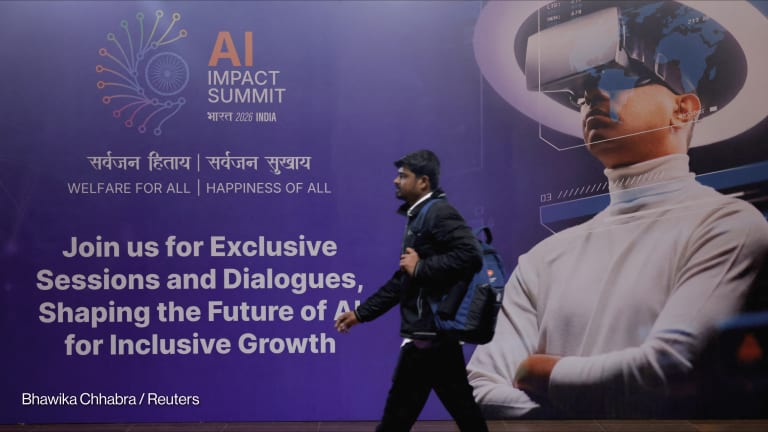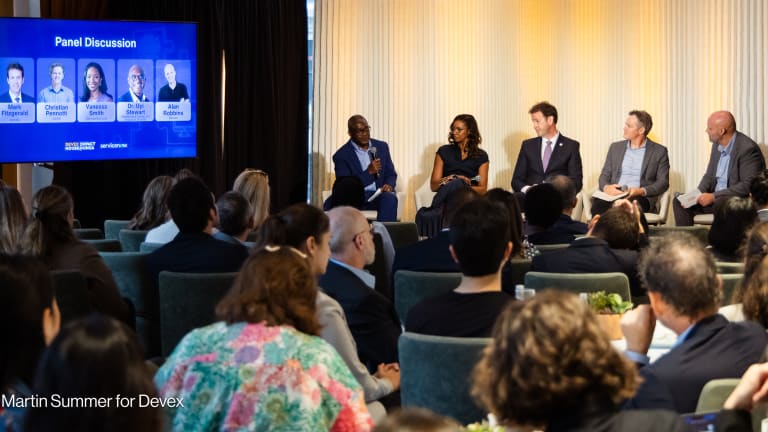
Machine learning is the ultimate way to go faster, said Peter Norvig, director of research at Google, as he showed a slide image of a race car to a crowd of professionals gathered to learn more about artificial intelligence.
But speed can also lead to accidents, Norvig warned, clicking to another slide with an image of a dramatic crash. Norvig, who is also the author of a leading textbook on artificial intelligence, or AI, was speaking at Train AI, a conference hosted by Figure Eight in San Francisco, California, this week.
“In every industry, there’s a place where AI can make things better,” Norvig told Devex. “Look at all of the AI technologies, and all problems, and it’s just a question of fitting them together and figuring out, ‘what’s the right technological match and what’s the right policy match?’”
Machine intelligence will have profound implications for the development sector. AI is a way to understand data, Norvig continued, and the global development community will be unable to understand and act on information coming in from cell phones to satellites without both human and machine intelligence.
See more related topics:
► Mobile World Congress highlights importance of connectivity for meeting SDGs
► ICT4D Jobs: Building a career in digital development
► Q&A: SystemOne CEO on data solutions improving health care in developing countries
Norvig will also speak at the upcoming AI for Global Good summit hosted at the International Telecommunications Unit in Geneva, Switzerland. Gatherings such as these help technologists connect solutions to problems, he said. From Silicon Valley to Hyderabad, India, where the ninth annual Information and Communications Technology for Development, or ICT4D, conference has just taken place, there is growing interest in bringing the technology community together with the global development community, in order to leverage AI to achieve the Sustainable Development Goals.
AI for good
“Every day we see a new news report on how AI is changing the future of every part of society,” said Robin Bordoli, chief executive officer of Figure Eight, which describes itself as an essential platform for data science. “Despite some of the concerns around job loss, we believe in the power of AI to create positive change at all levels of society.”
That is the thinking behind the launch of Figure Eight’s “AI for Everyone” challenge to put the power of AI into the hands of people who want to use machine intelligence to solve social problems. The company expects to see applications addressing global challenges in areas such as health care, food and nutrition, and climate change, and it is just the latest in a number of similar such competitions.
Earlier this month, XPRIZE, which puts on competitions together with partners, announced the 147 teams from 22 countries that would advance in the $5 million IBM Watson AI XPRIZE. The teams entering this global competition are working to develop AI applications that demonstrate how humans, together with AI, can tackle global challenges. Examples include Harvesting, a global intelligence platform for agriculture.
“With any automated and digital system you have to make sure you are not shutting out … or creating unintended problems for people who can't read, don't have devices, or otherwise are not able to access the new system.”
— Jake Kendall, director of the DFS LabAnd the Digital Financial Services Innovation Lab, an early stage incubator for entrepreneurs building financial technology companies in developing countries, has open challenges for biometrics and chatbots, with a deadline of May 30. DFS Lab is housed within Caribou Digital, a research and delivery consultancy in Seattle, Washington. The Bill & Melinda Gates Foundation funded the incubator to engage top scientists and engineers in challenges such as these around boosting financial inclusion, said Jake Kendall, director of the DFS Lab, who was formerly on the Financial Services for the Poor team at the Gates Foundation.
“Human interactions are always going to be necessary, but any time you can remove the need for them from a process through automation or NLP [natural language processing] conversational interfaces, that can be a game changer in terms of scalability and efficiency,” he told Devex via email. “NLP and bots give people tools to help themselves in the digital realm which can be really empowering. But there are downsides. With any automated and digital system you really have to make sure you are not shutting out certain people or creating unintended problems for people who can't read, don't have devices, or otherwise are not able to access the new system.”
Bringing AI to everyone
In the popular imagination, AI can feel like something that solves the problems of the affluent with products such as Alexa, the Amazon device that allow users to get information, play music, or control their smart homes using their voices. But many experts in the field believe there is a major role for AI in helping achieve the SDGs, and the founder of Arifu is making the case for the role of chatbots and AI in achieving the SDGs at the ICT4D conference. His education technology company, which launched in Kenya in 2015, points to how a chatbot leveraging AI can deliver personalized learning on mobile devices to provide access to information on topics such as farming, entrepreneurship or financial literacy to the world’s least served.
“We’re moving from the enterprise and the abstract to the consumer and the personal,” said Robert Munro, principal product manager at Amazon AI, at Train AI.
What that means for global health, for example, is a shift toward point of care tests, even in resource limited settings, he said.
Munro’s talk in San Francisco revisited AI’s progress after a series of talks he gave five years ago called “Where’s My Talking Robot.” AI is now making more decisions in our lives than most people realize, he said. It’s making us smarter, choosing our friends, selecting our news, aiding our health, moving us around, and protecting our security.
For example, he mentioned how the first alert for the swine flu outbreak in Mexico came from reading AI reports about potential disease outbreaks.
However, at a conference covering high-definition mapping, AI and medicine, and deep learning, examples of applications of machine learning in developing countries were few and far between.
Lukas Biewald, founder & executive chairman of Figure Eight, did talk about how one of his clients is using drones for conservation.
And in a series of presentations from Figure Eight customers, Sid Dixit, director of product program management at Planet, talked about how AI combined with millions of images from its small satellites can determine the health of forests and water resources, and monitor harvests and agriculture everywhere.
Anthony Goldbloom, CEO of Kaggle, talked about how Genentech, a biotechnology corporation, opened a challenge on his platform for machine learning competitions to predict which women would not be screened on schedule for cervical cancer, a largely preventable disease that several leaders in the global health community, including PATH in Seattle, Washington, are saying needs more attention in developing countries.
But the list of examples of applications of AI to the SDGs continues to grow. This week, at ICT4D, the international agriculture research consortium known as CGIAR launched a platform for big data in agriculture. It unites agricultural research institutes and companies with the goal of closing the digital divide between farmers in developed and developing countries. Amazon will bring its cloud computing and data processing capabilities, IBM, creator of the Watson artificial intelligence system, will bring its data analysis, and PepsiCo will bring its use of big data to manage supply chains.
The intelligent future
One of the lines that came up at the AI conference in San Francisco was recent comments by physicist Stephen Hawking, who said that this technology will be “either the best, or the worst thing, ever to happen to humanity.”
Silicon Valley is behind a number of initiatives working to ensure that AI benefits humanity, including OpenAI, a nonprofit AI research company, to ensure that the benefits of machine learning are as widely and evenly distributed as possible.
And increasingly, forward looking thinkers in the global development community are presenting themselves as natural partners in these efforts, as the ITU has done in organizing the AI for Global Good Summit together with XPRIZE and other United Nations agencies.
“As the U.N. specialized agency for information and communication technologies, ITU aims to guide AI innovation towards the achievement of the U.N. SDGs,” ITU Secretary-General Houlin Zhao said of the event, which kicks off June 07. “We are providing a neutral platform for international dialogue to build a common understanding of the capabilities of emerging AI technologies.”
The ITU’s most recent magazine is entirely focused on how AI can boost sustainable global development.
The biggest risks posed by the rise of AI is not so much the singularity, in which machine intelligence matches then surpasses human intelligence, but wasted projects and dollars, said two venture capitalists from Bloomberg Beta, which makes early stage investments in artificial intelligence startups. Echoing some of the points made by Norvig of Google, they said the key is to use AI to solve real problems. Of course, global development professionals are working on complex problems that might appeal to machine learning experts looking to use their skills for good, which is why any effort to ensure AI benefits humanity might consider bringing these communities together.
Update, May 7, 2018: This article has been updated to reflect Figure Eight’s name change. The company was previously named CrowdFlower.
Search for articles
Most Read
- 1
- 2
- 3
- 4
- 5








